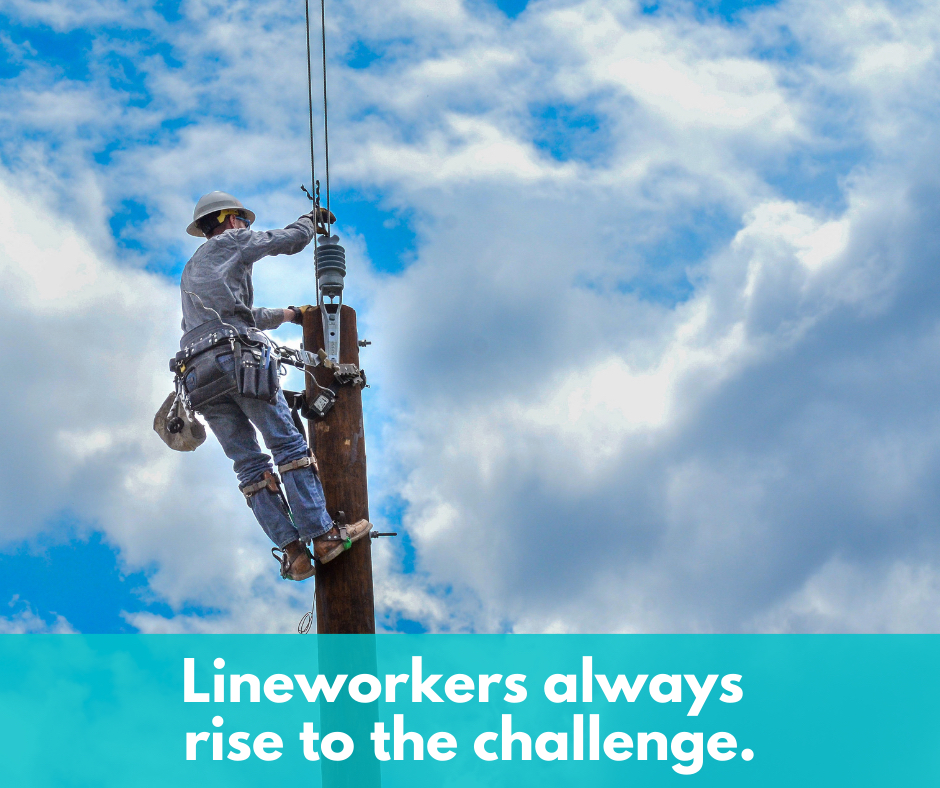Manager Connection – Lineworker Appreciation
By Syd Briggs,
General Manager

It is not unusual for me to receive emails, letters, and phone calls thanking Steele-Waseca Cooperative Electric for the work our line crews do.
It takes a great dedication of knowledge, time, and physical fitness to be a lineworker. There are many situations dealing with all kinds of equipment at different power levels our lineworkers have to be familiar with and prepared for; and frequently those situations happen at inconvenient times and in the worst weather. In addition, lineworkers get great satisfaction continually developing their skills and abilities as they “keep the lights on.”

As we celebrate Lineworker Appreciation Day Monday, April 11, I thought I’d share some interesting facts about electric lineworkers with you. The work can be heavy, in more ways than one. Did you know the equipment and tools a lineworker carries while climbing a utility pole can weigh up to 50 pounds? That’s the same as carrying six gallons of water. Speaking of utility poles, lineworkers are required to climb poles ranging anywhere from 30- to 120- feet tall. With the advancements in bucket trucks, lineworkers are able to access poles and lines under a variety of conditions and terrains, but pole climbing is still a necessity in their profession. Needless to say, if you have a fear of heights, this likely isn’t the career path for you.
Lineworkers must be committed to their career—because it’s not just a job, it’s a lifestyle. The long hours and ever-present danger can truly take a toll. In fact, being a lineworker is listed in the top 10 most dangerous jobs in the U.S. They often work non-traditional hours, outdoors in difficult conditions.
While the job does not require a college degree, it does require technical skills, years of training and hands-on learning. Did you know to become a journeyman lineworker can take more than 7,000 hours of training (or about four years)? That’s because working with high-voltage equipment requires specialized skills, experience and an ongoing mental toughness. Shortcuts are not an option, and there is no room for error in this line of work.
Despite the many challenges, Steele-Waseca lineworkers are committed to powering members in our service area. During severe weather events that bring major power outages, lineworkers
are among the first ones called. They must be ready to leave the comfort of their home and families unexpectedly, and they don’t return until the job is done. That’s why the lineworker’s family is also dedicated to service.
Nationwide, there are approximately 120,000 electric lineworkers. Steele-Waseca has 12 lineworkers responsible for keeping power flowing 24/7, 365 days a year. To do this, they maintain over 2,200 miles of power lines across nine counties and 900 square miles.
In addition to the highly visible tasks lineworkers perform, today’s lineworkers are information experts who can pinpoint power outages from miles away. Line crews now use laptops, tablets, and other
technologies to map outages, survey damage and troubleshoot problems.
Being a lineworker may not seem like a glamorous job, but it is absolutely essential to the life of our members within our service area. Without their exceptional dedication and commitment, we simply
would not have the reliable electricity we need for everyday life. The next time you see a lineworker, please thank them for the work they do to keep power flowing, regardless of the time of day or weather conditions. After all, lineworkers are the power behind your power. You can also follow #ThankALineworker on social media to see how others are recognizing lineworkers.

Service
#swceSERVICE




